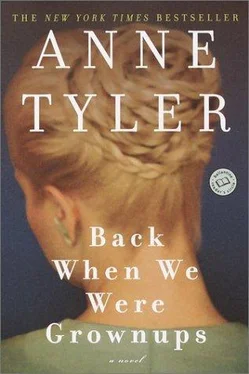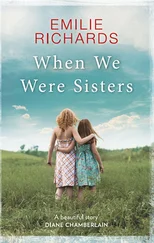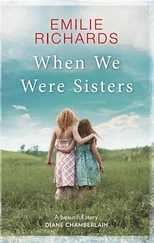“It doesn’t have to be really a mansion, but it should have that atmosphere. That upper-class, elegant atmosphere. And then I’ll want it decorated in baby blue and white, with a cloudlike effect in the dining room.”
“Cloudlike?”
“Yes, ethereal; know what I mean?”
“We can decorate however you like,” Rebecca said, “but our dining room is papered in a maroon-and-gold stripe and the furniture is some dark kind of wood; walnut, I believe. So I’m not sure—”
“Oh, you can do it! I know you can! Paulina Garrett told me their party last spring was wonderful. Everything so joyous, she said; you made it such an occasion that nobody wanted to leave.”
Rebecca remembered the Garrett party all too well. A torrential thunderstorm had sprung up and somehow, by some process that she still didn’t quite understand, caused the front-parlor chandelier to start raining on the guests. Nice to hear that the Garretts didn’t hold it against her.
“The reason I want blue and white,” Mrs. Mink was saying, “is we know this will be a boy. They’ve had that special test. And we know he’s not going to live very long.”
“Excuse me?”
“He’s got some kind of disease they can diagnose in the womb.”
“Oh, that’s terrible!” Rebecca said.
“So I want this party to be perfect, don’t you see? Every last detail. I want his life to be perfect. Because he gets to experience it for such a little while.”
“Well, of course,” Rebecca said.
But while she was discussing the fine points — the folding paper parasol, the white-clouded blue cotton tablecloth she’d seen advertised at Lust for Linens — she was reflecting that really, this baby’s story was just a shortened version of everybody’s story. Get born; die. Nothing more to it than that.
“And flowers?” Mrs. Mink was asking. “Paulina tells me you can recommend a florist.”
“Yes, NoNo,” Rebecca said.
“Pardon?”
“My stepdaughter, NoNo Sanborn. She could set out white asters and those pale-blue flowers, those what-do-you-call-them…”
In fact, Rebecca couldn’t think offhand of any flowers that were blue, except for those chicory blossoms that grew wild along the highways and closed up in tight little winces if you picked them. She said, “I can’t remember. I don’t know. I don’t have any idea.”
“Well, that’s all right, we’ll just ask your—”
“I don’t know. I just don’t know. I’ll have to call you back,” Rebecca said, and she replaced the receiver, which all of a sudden weighed too much to hold on to any longer.
* * *
Lately, she’d been feeling so… What was the word? Blank. Low in spirit, flat as a desert; and now she grew more so every day. Getting up in the morning was like hauling a dead body. Food lost its flavor. Conversation required calling upon every muscle, summoning her last particle of strength. She kept noticing how very little there was in this world to talk about. It was turning into a beautiful fall — clear and mild, the leaves staying on the trees much later than usual — but the brilliant colors hurt her eyes, and the meditation center’s banner flapping in the breeze made a sinister, leathery sound, like bat wings.
Not a person in the family asked where Will had disappeared to. Well, except for her mother. (“Oh, Rebecca,” she said sadly, once she’d heard the facts, “you were a fool thirty-three years ago and you’re a fool today.”) But the girls behaved as if he had never existed. She suspected they were trying to spare her feelings — taking it for granted, no doubt, that she had been jilted.
One night when she had nothing to do she got in her car and drove to Macadam. She parked in front of Mrs. Flick’s house and gazed up at the second-floor windows. All of them were dark, though. Which was lucky, she supposed, because really it was the romance she missed; not Will himself. Still, she sat there a long, long time before she started her engine and drove home again.
She told Zeb, in one of their bedtime phone talks, that she thought the human life span was too long. “Really, I’ve finished my life,” she said. “I finished it when the girls got grown. But here I am, just hanging around, marking time, waiting for things to wind down.”
Zeb said, “Rebecca? Are you all right ?”
“Define ‘all right,’” she told him.
“Where is your man friend?” he asked.
“He’s gone.”
“You ditched him?”
“Yes, but that’s not the problem. The problem is, I’ve outlived myself.”
“Well,” he told her, “remember what George Eliot said.”
“What did George Eliot say?”
“Or maybe it wasn’t George Eliot. At any rate: ‘It’s never too late to do what you want to do.’ Remember that.”
“What?” Rebecca said. “Well, of all the — Why, that’s just plain wrong ! Suppose I wanted to… I don’t know; suppose I wanted to get pregnant! That’s just plain ridiculous !”
She was so outraged that she hung up, not knowing she was planning to. Then she regretted it. When the phone rang a few seconds later, she lifted the receiver and said, “Sorry.”
“I just remembered,” Zeb said. “It wasn’t ‘do what you want to do.’ It was ‘be what you want to be.’ I think.”
“I’m just feeling a little tired,” Rebecca told him.
“And I don’t even know for sure that it was George Eliot.”
She said, “Thanks for trying, Zeb.”
* * *
She might have thrown herself into work, but business was very slow these days. Three different people had called to ask if the Open Arms was in a safe neighborhood, and although she had assured them it was — with reasonable precautions, she said; using normal common sense — they told her they would have to think it over and get back to her.
Besides, how often could a person celebrate? How many weddings, christenings, birthdays could she applaud, for heaven’s sake? What was the purpose of it all?
Her New York Times collected in stacks and gradually turned yellow, untouched. Her New Yorker s drifted to Poppy’s room and she never asked for them back. She passed her New York Review s on to Troy without giving them a glance; she told him she thought there was something perverted about book reviews that were longer than the books they were reviewing.
One morning the library phoned to say that her interlibrary loan was in, and she made herself walk over to collect it. But it turned out the book was so rare — a crumbly brown leather volume edged in flaking gold — that she was not allowed to take it home with her. She had to read it there in the reading room, the librarian told her. (This was the same librarian who’d arranged the loan in the first place, but she issued her edict in such a disapproving voice, with such a humorless, raisin face, that Rebecca couldn’t imagine why she’d once seemed a kindred spirit.)
She did try. She did settle at a table and pluck the cover open with the very tips of her fingers and leaf obediently through the brittle ivory pages. A Baltimorean’s Experience of the War for Southern Independence, the book was called. The author was a lawyer named Nathaniel Q. Furlong, Esq., who claimed to have known Robert E. Lee when Lee was still a private citizen. Years before the War, Mr. Furlong maintained, Lee had confided to him that he could never support a cause that would allow the slaves — the “heathen Africans,” in his words — to return to their native land and forfeit their one chance for Christian salvation. But when Rebecca managed to locate this passage (which was, she saw for the first time, of dubious credibility, written by a man whose boastful, unreliable nature revealed itself in every line), she wondered why she had found it so momentous back in college. She had just wanted to believe, she supposed, that there were grander motivations in history than mere family and friends, mere domestic happenstance.
Читать дальше












